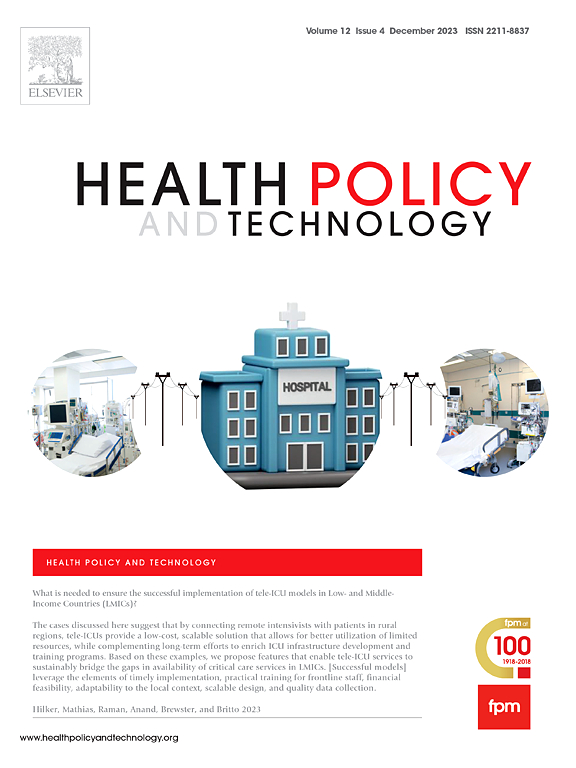Investigating the moderating effect of COVID-19 on Pakistan's healthcare sector
IF 3.7
3区 医学
Q1 HEALTH POLICY & SERVICES
引用次数: 0
Abstract
Background
The COVID-19 pandemic has drastically disrupted health service delivery, particularly in resource-limited countries such as Pakistan. This study aims to assess how Pakistan's healthcare infrastructure has adapted in response to the pandemic, focusing on governmental strategies, technology integration, and socioeconomic factors influencing public health outcomes.
Materials and Methods
A stratified random sampling approach was employed, distributing 300 questionnaires to management and staff across hospitals in Punjab. The data collected were analyzed using PLS-SEM4 software to uncover the relationships among the variables of interest.
Results
The findings reveal the complex impacts of the pandemic on healthcare delivery. Effective government regulations were identified as crucial in managing the crisis, while technology integration emerged as a key factor in enhancing healthcare services. Socioeconomic conditions were found to significantly affect public health outcomes, underscoring the interconnection of these components.
Conclusion
This study provides valuable insights for policymakers, healthcare professionals, and researchers aiming to strengthen the resilience of Pakistan's healthcare system. By applying resilience theory, public health policy theory, and complex adaptive systems theory, the research emphasizes the need for adaptability, effective governance, and systemic interconnection in addressing public health challenges. The implications extend globally, offering strategies to improve healthcare infrastructure during crises.
调查2019冠状病毒病对巴基斯坦医疗保健部门的缓和作用
COVID-19大流行严重扰乱了卫生服务的提供,特别是在巴基斯坦等资源有限的国家。本研究旨在评估巴基斯坦的医疗基础设施如何适应疫情,重点关注政府战略、技术整合和影响公共卫生结果的社会经济因素。材料与方法采用分层随机抽样的方法,向旁遮普省各医院的管理人员和工作人员发放了300份问卷。收集的数据使用PLS-SEM4软件进行分析,以揭示感兴趣的变量之间的关系。结果研究结果揭示了疫情对医疗服务的复杂影响。有效的政府法规被认为是管理危机的关键,而技术整合则成为加强医疗保健服务的关键因素。研究发现,社会经济条件显著影响公共卫生结果,强调了这些组成部分的相互联系。本研究为决策者、医疗保健专业人员和旨在加强巴基斯坦医疗保健系统弹性的研究人员提供了有价值的见解。通过运用弹性理论、公共卫生政策理论和复杂适应系统理论,强调应对公共卫生挑战需要适应性、有效治理和系统互联。其影响延伸至全球,提供了在危机期间改善医疗基础设施的战略。
本文章由计算机程序翻译,如有差异,请以英文原文为准。
求助全文
约1分钟内获得全文
求助全文
来源期刊

Health Policy and Technology
Medicine-Health Policy
CiteScore
9.20
自引率
3.30%
发文量
78
审稿时长
88 days
期刊介绍:
Health Policy and Technology (HPT), is the official journal of the Fellowship of Postgraduate Medicine (FPM), a cross-disciplinary journal, which focuses on past, present and future health policy and the role of technology in clinical and non-clinical national and international health environments.
HPT provides a further excellent way for the FPM to continue to make important national and international contributions to development of policy and practice within medicine and related disciplines. The aim of HPT is to publish relevant, timely and accessible articles and commentaries to support policy-makers, health professionals, health technology providers, patient groups and academia interested in health policy and technology.
Topics covered by HPT will include:
- Health technology, including drug discovery, diagnostics, medicines, devices, therapeutic delivery and eHealth systems
- Cross-national comparisons on health policy using evidence-based approaches
- National studies on health policy to determine the outcomes of technology-driven initiatives
- Cross-border eHealth including health tourism
- The digital divide in mobility, access and affordability of healthcare
- Health technology assessment (HTA) methods and tools for evaluating the effectiveness of clinical and non-clinical health technologies
- Health and eHealth indicators and benchmarks (measure/metrics) for understanding the adoption and diffusion of health technologies
- Health and eHealth models and frameworks to support policy-makers and other stakeholders in decision-making
- Stakeholder engagement with health technologies (clinical and patient/citizen buy-in)
- Regulation and health economics
 求助内容:
求助内容: 应助结果提醒方式:
应助结果提醒方式:


